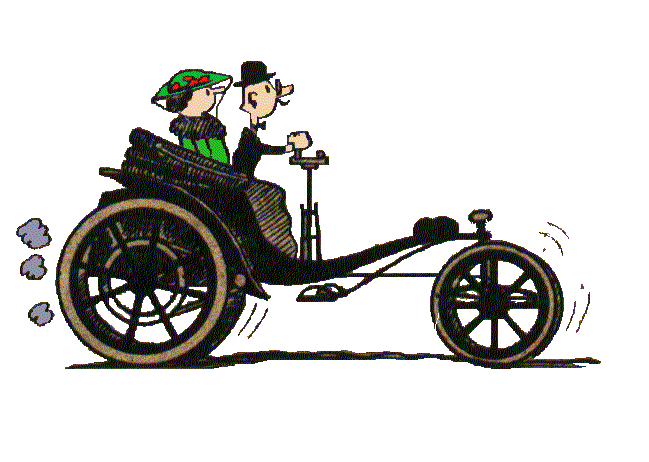B.B.C. Radio Programme
The following is the script from a radio broadcast of "In Britain Now" on the BBC Home Service on June 24th, 1942 (6.30-7.00 pm) given by Herbert Farthing (1865-1954) of Sherborne who collected what was to become our Clément Panhard from the docks at Southampton in 1900 along with Colonel Baxter. Mr Farthing worked at Childs & Sons Motor Engineers in Sherborne.
The BBC paid Mr Farthing £2 2s 0d. in old money which is equal to two guineas. That is almost £70 in today's money.
The Bournemouth Daily Echo carried an article on 30 June 1942 covering Mr Farthing's appearance on the BBC.
Today, according to Google Maps, this is a journey of 62 miles and would take just under two hours to complete by car. Perhaps a better comparison against a 1900 car is the six hours it would take by bicycle.

“In Britain Now": June 24th 1942
The car came over from France one Sunday morning in June 1896. I was down at the docks, at Southampton, waiting for her. She was a Clément Panhard made by the Panhard Company, four horsepower, horizontal engine behind the driving seat; two high wheels behind, chain driven. And Mr. Baxter, he was Colonel Baxter later on, of the 4th Dorset Territorial - had gone over to France to learn to drive and to fetch the car home. I'd promised to meet him at the docks, and he was going to teach me to drive.

Herbert Farthing of Sherborne
Well, there they were, at seven o'clock on Sunday morning. We pushed the car outside the dock-gates. "Well", I said, "what about it?". Mr. Baxter gave me the book of instructions. "That's no good" I said, "it's in French", I could not read French, neither could Mr. Baxter. "Well", I said, "you've been over there for a week. You ought to know how to drive". He said all the tuition he'd had, was the man driving him from the works to the docks. But he told me there was an Electric Ignition and a Lamp Ignition. I knew something about the lamp ignition, which was what we used on gas and oil engines. So I lighted up the lamp and got the tube red-hot. We found the petrol and turned it on, and after a long time, we got her to start. I said, "you'd better take the wheel". We managed to get into low gear, and off we went, through Southampton at four miles an hour. I asked, had we enough petrol. "Yes" he said "enough to go to Lands End". "Well", I said, "we don't want to go there. Sherborne is where we want to go"...
Sherborne was 60 miles away, and the car was supposed to do 50 miles to the gallon. We managed to keep on at four miles an hour. We used the same amount of petrol going downhill as going up, as we couldn't change gear. At Whiteparish, the car came to a full stop. The petrol tank was dry. They said over in France it would go just as well on paraffin as petrol, so we got some paraffin and off we went again. Then the car stopped dead against the three-mile stone just outside Salisbury. Mr Baxter walked to Salisbury and brought back a two-gallon tin of petrol - petrol in those days could only be obtained at places like Southampton, Salisbury or Yeovil.
We got to Salisbury at three o'clock and drove into a hotel yard, covered in grease, oil and dust, as there were no screens and the dust came up over the back and front in clouds.
The first thing I wanted was a drink, for every time we got to a roadside pub the car was going well, and we dare not stop. After a good long drink and a wash, and lunch, we made another start, for Shaftesbury, and got there just after six. Of course, we had a crowd there, as a car was still a novelty, and not many people went to church that night. Another nine miles and we came to a full stop again, at Bow Bridge, looking in the tank - "he were dry". So I walked to a cycle shop a mile away and asked for petrol. They'd never heard of petrol. I got some benzoline and put that in. The car spit and sputtered and finished up knocking my thumb out of joint. By now it was getting dark so we pushed the car a mile into the cycle works yard, hired bikes and rode home to Sherborne, six miles, arriving at midnight. Seventeen hours to cover 60 miles. Next day Mr. Baxter said he was going to Yeovil after some petrol, and would I go with him and fetch the car back. I said no, not until he had the book translated.
Well, that was motoring forty-six years ago. I've been driving ever since - I'm 77 now - and next week I'll be laying my car up, and I shall be back where I was before that Sunday car ride to Sherborne.
Below is The Bournemouth Daily Echo which carried an article on 30 June 1942 covering Mr Farthing's appearance on the BBC as well as the script used on the right.
Some of the details that Mr Farthing gives about the age and make of the car are incorrect, but after 40 years it is easy to forget.



